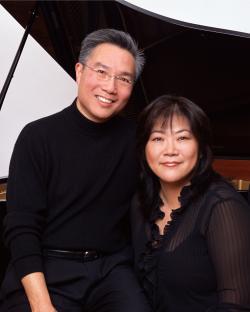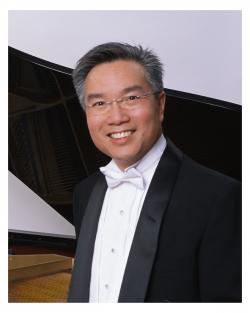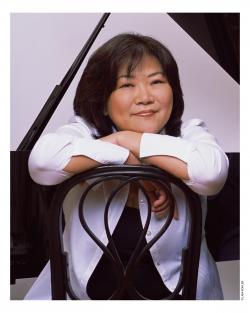MMTA Annual Convention
Join us for the 125th Annual MMTA State Convention
Sunday - Tuesday, June 2-4, 2024
Location: Normandale Lutheran Church (6100 Normandale Rd, Edina, MN 55436)
Register Here
Sign up to be a presider/doorkeeper for one or more sessions:
Monday Volunteer Sign Up Tuesday Volunteer Sign Up
Convention Schedule
Member Recital (Free and open to public)
MMTA Student Composition Contest Winners Recital (Free and open to public)
Sunday afternoon, June 2nd, 2024 at Normandale Lutheran Church
Master Classes: Joint Piano Masterclass (Free and open to public)
There will be a 90 minute joint piano masterclass on Tuesday morning, June 4th at Normandale Lutheran Church.
Master Class: Guitar (Free and open to public)
There will be a 90 minute joint piano masterclass on Tuesday morning, June 4th at Normandale Lutheran Church.
Keynote Speakers: Alvin Chow and Angela Cheng

Alvin Chow and Angela Cheng will be the featured guest pianists during the 2024 MMTA Convention. The duo will give a keynote speech, perform a 75 minute recital, and host a 90 minute masterclass.
"The Pursuit of Perfection, The Achievement of Excellence".
This focuses on the principle that good performances come from good practice techniques, and we discuss some organizational principles of how to practice effectively, as well as a demonstration of the practice methods which we use most frequently.

Alvin Chow has appeared throughout North America and Asia as orchestral soloist and recitalist. In addition, he has performed extensively in duo-piano recitals with his wife, Angela Cheng, and his twin brother, Alan. A native of Miami, Florida, he graduated summa cum laude and Co-Valedictorian (with his brother) at the University of Maryland, where he was a student of Nelita True. Mr. Chow received the Victor Herbert Prize in Piano upon graduation from the Juilliard School, where he studied with Sascha Gorodnitzki, and held the Joseph Battista Memorial Scholarship at Indiana University as a student of Menahem Pressler.
Learn more about Alvin Chow.

Consistently praised for her brilliant technique, tonal beauty and superb musicianship, Canadian pianist Angela Cheng is one of her country’s national treasures. She has appeared as soloist with more than 100 orchestras, including the Israel Philharmonic, Boston Pops, Buffalo Philharmonic, and the symphonies of Montreal, Toronto, Vancouver, St. Louis, Houston, San Diego, Indianapolis, Syracuse, Utah and Colorado. An avid recitalist, Ms. Cheng has performed solo and chamber recitals throughout North America, Asia, and Europe, including New York City (Avery Fisher Hall, Alice Tully Hall, and Walter Reade Theater at Lincoln Center, Weill Recital Hall at Carnegie Hall, and the 92nd Street Y), Wigmore Hall in London, the Kennedy Center in Washington, D.C., Disney Hall in Los Angeles, Mozarteum in Salzburg, Musikverein in Vienna, the Concertgebouw in Amsterdam, the Teatro Colon in Buenos Aires, the Mariinsky Concert Hall in St. Petersburg and the Sydney Opera House, as well as in Shanghai, Beijing, Hong Kong, Montreal, Toronto, Taiwan, Italy and Australia. In 2012 she made her Carnegie Hall debut as soloist with the Edmonton Symphony.
Learn more about Angela Cheng.
Hotel Information:
Holiday Inn Bloomington W MSP Airport Area (5120 American Blvd West, Bloomington, MN 5543)
This hotel is located around the airport hotel zoon and it's only 10min driving distance from the Normandale Lutheran Church. When making your reservations, please make sure to click on Make a Reservation then enter your check in /check out dates. This will bring up the negotiated rate of $134.00 per night. Another option would be to call the hotel (612.452.5510) to make the reservation stating that you are with Minnesota Music Teachers Association.
If you prefer to stay at other hotels, feel free to book your favorite one. We will then see you at the convention!
20 min Lightning Sessions
- June 3, Monday -
Oddly Practical Piano Pieces: A brief introduction to the music of Mitch Grussing - Mitch Grussing
Linking Meter and Rhythm via the Conductor's Baton - Rebekah Richards
Piano Solo Festival - Caroline Langfeld
Introducing Improvising Skills with “Musica Nara for Piano” (2005 composition by Minako Tokuyama ) – A New Teaching Approach for Classically Trained Pianists - Dr. Yumiko Oshima-Ryan
- June 4, Tuesday -
One-Hit Wonders By Wonder Women - Sue Ruby
Minnesota's newest online pedagogical music marketplace - Mitch Grussing
MMTA Voice and Instrumental Programs overview - Katie Johnson
Backing track - Gene Swanson
50 min Session
- June 3, Monday -
President's Welcome Opening Session
The Pursuit of Perfection, The Achievement of Excellence - Keynote Speakers: Alvin Chow and Angela Cheng
The French Connection - Sue Ruby
Music Bridges Showcase - Mary Goetz
Piano Exam Preparation - Mary Beth Millner
Beyond Contest - Amy Grinsteiner
That's a lot easier than it sounds! - Rebekah Richards
PIANO SHOPPING 101: Your Guide to Finding the Perfect Piano! - Sue Freeman Dopp
Shall We Dance? - Stella Branzburg Sick & George Frederick Litterst
Give me a Minute, 24 Short Piano Pieces in Every Key - John Cheek
Protect Your Hearing in Less Time Than It Takes to Damage It - Brian J. Felsen
Downsizing your home - Sondra Howe
American Women Composers of Ragtime - a Sampler - Gail Olszewski
How to incorporate piano duets in ensemble playing in your studio - Kathryn Karg
The SMART Approach - Sonja Graham
Beyond the Critiques; Benefits of Being an MMTA Judge - JEC Committee Judge Education Committee
- June 4, Tuesday -
Joint Piano Master Class - Keynote Speakers: Alvin Chow and Angela Cheng
Contest Committee - President / Caroline Langfeld / SAs
Pronouns, Gender Reveal Parties, and “The Surgery”: Debunking Common Myths about Gender Diversity -Logan Sand
So You Have Been Asked to Play the Organ: A Guide For Pianists - Mary Newton
Guiding our youngest learners - Sarah McCaffrey Ritchie
A Sneak Peek to the 2023 Syllabus: Etudes to Supplement Teaching - Piano Exam Development Commitee
Out of the Ordinary - Dr. Sara Langmead
Composition, Interpretation & Education - go together like the horse and carriage - Sharon Kaplan
Judging Keyboard Theory Exams Levels 1-4 - Theory Development Committee and the Judges Education Committee.
The Magic of Pedals - Suzanne Greer
Guitar Masterclass - Austin Wahl
Scores! What are they good for? - Michael Rector
ADHD Beyond the Behaviors - Mitch Grussing
Site-Administrator Meeting - (1) President, (2) VP-Education, (3) Program directors (theory, piano, sight playing, bridges), (4) Site administrators, and (5) office staff
